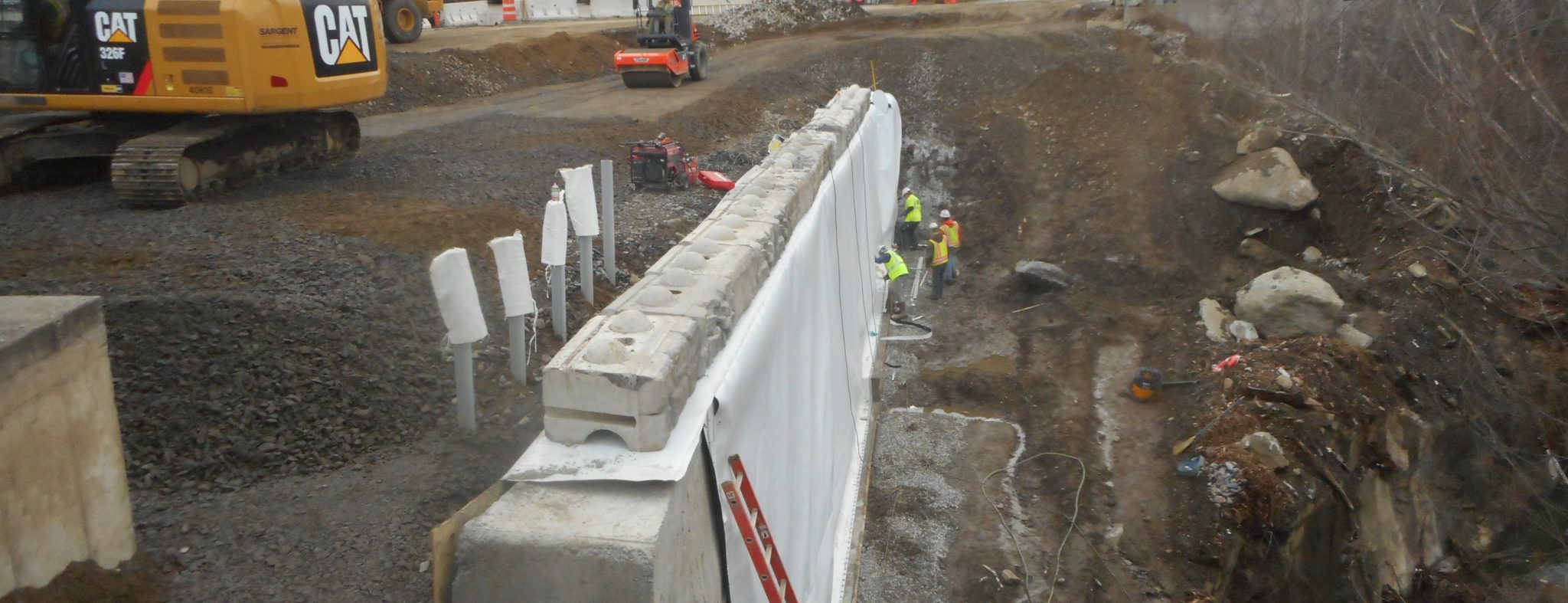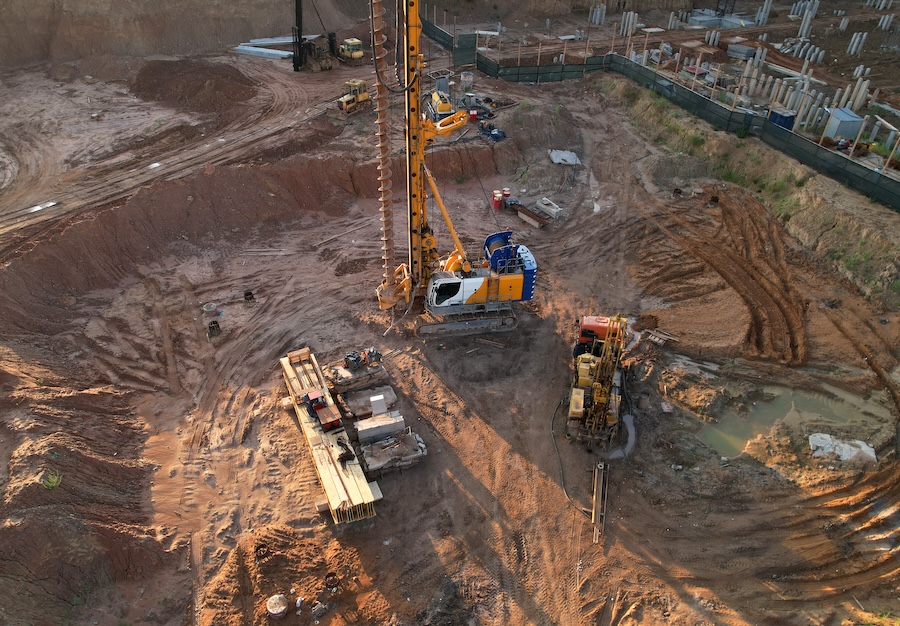Discovering the Cutting-edge Methods and Technologies Shaping the Future of the Geotechnical Market for Sustainable Engineering Solutions
The geotechnical market is undergoing a transformative change, driven by ingenious strategies and technologies that stress sustainable engineering services. Advanced soil stablizing methods, making use of wise materials, and the application of data analytics are redefining just how we come close to infrastructure difficulties. As these advancements promote ecological stewardship, they also raise essential questions regarding their useful execution and long-term effectiveness. Understanding the interplay in between these advancements and their potential to change the field welcomes more exploration right into the future of lasting engineering techniques.
Advanced Dirt Stabilization Strategies
Dirt stablizing is an essential process in geotechnical engineering, targeted at boosting the physical buildings of dirt to improve its load-bearing capability and resilience. Advanced dirt stablizing strategies play a critical duty in resolving challenges related to weak or unstable dirts, consequently allowing safe and reliable construction techniques.
Amongst the famous methods, chemical stablizing involves using additives such as lime, cement, or fly ash, which respond with dirt bits to create a more natural mass. This method is particularly reliable in enhancing the toughness and dampness resistance of extensive clay soils. Mechanical stabilization, on the other hand, involves the physical modification of dirt homes through compaction or the consolidation of granular products, resulting in improved thickness and security.
Another ingenious approach is the use of geosynthetics, which supply reinforcement and minimize dirt erosion while enhancing water drainage. Methods like soil blending and deep dirt stablizing are also getting grip, enabling for in-situ treatment of bothersome soils. Collectively, these sophisticated techniques not only boost the efficiency of dirt frameworks but likewise contribute to sustainable engineering practices by decreasing the need for substantial excavation and material transport.
Smart Products in Geotechnics
Innovation goes to the forefront of geotechnical design, particularly with the incorporation of wise products that improve the performance and performance of dirt frameworks. Smart products, such as shape memory alloys, piezoelectric materials, and self-healing polymers, are reinventing the means designers approach soil stabilization and facilities longevity (geo tech engineer). These materials can adapt to changing ecological conditions, reply to anxiety, and even fix themselves, dramatically enhancing the durability of geotechnical systems
For circumstances, piezoelectric materials can produce electric costs in action to mechanical tension, supplying possible for real-time monitoring of soil conditions and structural integrity. Self-healing products can autonomously repair cracks and damages, lowering maintenance costs and expanding the lifespan of geotechnical properties. The combination of these clever materials not only boosts the mechanical properties of dirt but likewise adds to sustainable design techniques by decreasing source intake and environmental influence.
As the geotechnical sector remains to evolve, the fostering of clever products will play an important duty in developing ingenious solutions, ensuring that frameworks are not just durable but likewise adaptable to future difficulties. This transformative method is poised to redefine the requirements of safety and security and efficiency in geotechnical design.
Information Analytics for Facilities
The assimilation of wise products in geotechnical engineering has led the way for advanced approaches, particularly in the realm of information analytics for facilities. This cutting-edge technique leverages substantial data collection and analytical techniques to boost decision-making processes throughout the infrastructure lifecycle. By making use of sensors embedded in smart products, engineers can continuously check vital specifications such as dirt stability, dampness degrees, and structural honesty.
Data analytics allows the my website change of raw data into workable understandings, enabling for predictive maintenance and boosted danger management. Advanced formulas and equipment understanding methods facilitate the identification of patterns and abnormalities, which can inform timely interventions and maximize resource allotment. Furthermore, integrating geographic information systems (GIS) enhances spatial analysis, further improving the decision-making framework.
As infrastructure tasks grow in complexity, the dependence on data analytics becomes progressively vital. It cultivates a proactive technique, lessening the possibility of failings and ensuring the longevity and sustainability of frameworks. By using the power of information analytics, the geotechnical industry is positioned to not only boost present techniques however additionally pioneer cutting-edge services for future facilities difficulties. This synergy of technology and engineering concepts will define the future of lasting facilities growth.

Lasting Ground Renovation Techniques
Numerous lasting ground enhancement methods are becoming important services to deal with the difficulties of geotechnical engineering while decreasing environmental impact. These approaches not only boost soil efficiency but additionally advertise eco-friendly stewardship by decreasing dependence on standard, more invasive strategies.

An additional innovative technique is the application of geosynthetics, that includes eco-friendly materials that reinforce soil while promoting drainage and erosion control - consulting engineer. This reduces the requirement for hefty equipment and lessens site disruption, hence maintaining regional communities
In enhancement, techniques such as dynamic compaction and vibro-replacement have evolved to consist of sustainable techniques, incorporating recycled products and lowering carbon impacts. These approaches exemplify the sector's change towards more environmentally responsible remedies, ensuring that ground enhancement not only satisfies engineering demands however additionally adds favorably to the surrounding atmosphere.
Technologies in Ecological Surveillance
Recently, advancements in environmental monitoring have significantly enhanced the ability to examine and handle geotechnical projects with very little eco-friendly disturbance. Innovative innovations, such as remote picking up, Net of Points (IoT) gadgets, and real-time information analytics, are transforming exactly how ecological effects are measured and alleviated.
Remote noticing innovations, including satellite imagery and airborne LiDAR, help with the quick analysis of land use adjustments and ecological problems - geotechnical engineers. These devices enable for constant surveillance of sites, allowing designers to recognize prospective issues prior to they escalate. Furthermore, IoT tools, equipped with sensors for specifications like dirt wetness, temperature level, and gas exhausts, provide real-time information streams that enhance the understanding of site-specific ecological variables
Real-time information analytics even more refine decision-making procedures by integrating data from various resources, permitting for proactive management methods. This holistic strategy not only makes certain compliance with environmental policies however likewise advertises sustainable practices within the geotechnical market.
As these advancements remain to advance, they hold the prospective to link the void in between design objectives and ecological stewardship, fostering a more sustainable future for geotechnical jobs worldwide.
Conclusion
To conclude, the geotechnical market is going through a transformative evolution driven by cutting-edge techniques and technologies that focus on sustainability. Advanced dirt stabilization methods, the integration of clever materials, and the application of data analytics collectively enhance the strength and effectiveness of framework. Lasting ground renovation methods and developments in ecological surveillance emphasize the market's commitment to ecological stewardship. These developments not only address modern design challenges however likewise lead the way for an extra lasting future in geotechnical practices.
Strategies like soil blending and deep soil stablizing are likewise obtaining traction, enabling for in-situ treatment of bothersome soils. Jointly, these innovative approaches not just enhance the efficiency of dirt structures however likewise contribute to sustainable design methods by minimizing the requirement for substantial excavation and material transport.

Comments on “Top Geotechnical Engineers for Cutting-Edge Soil Analysis and Foundation Design”